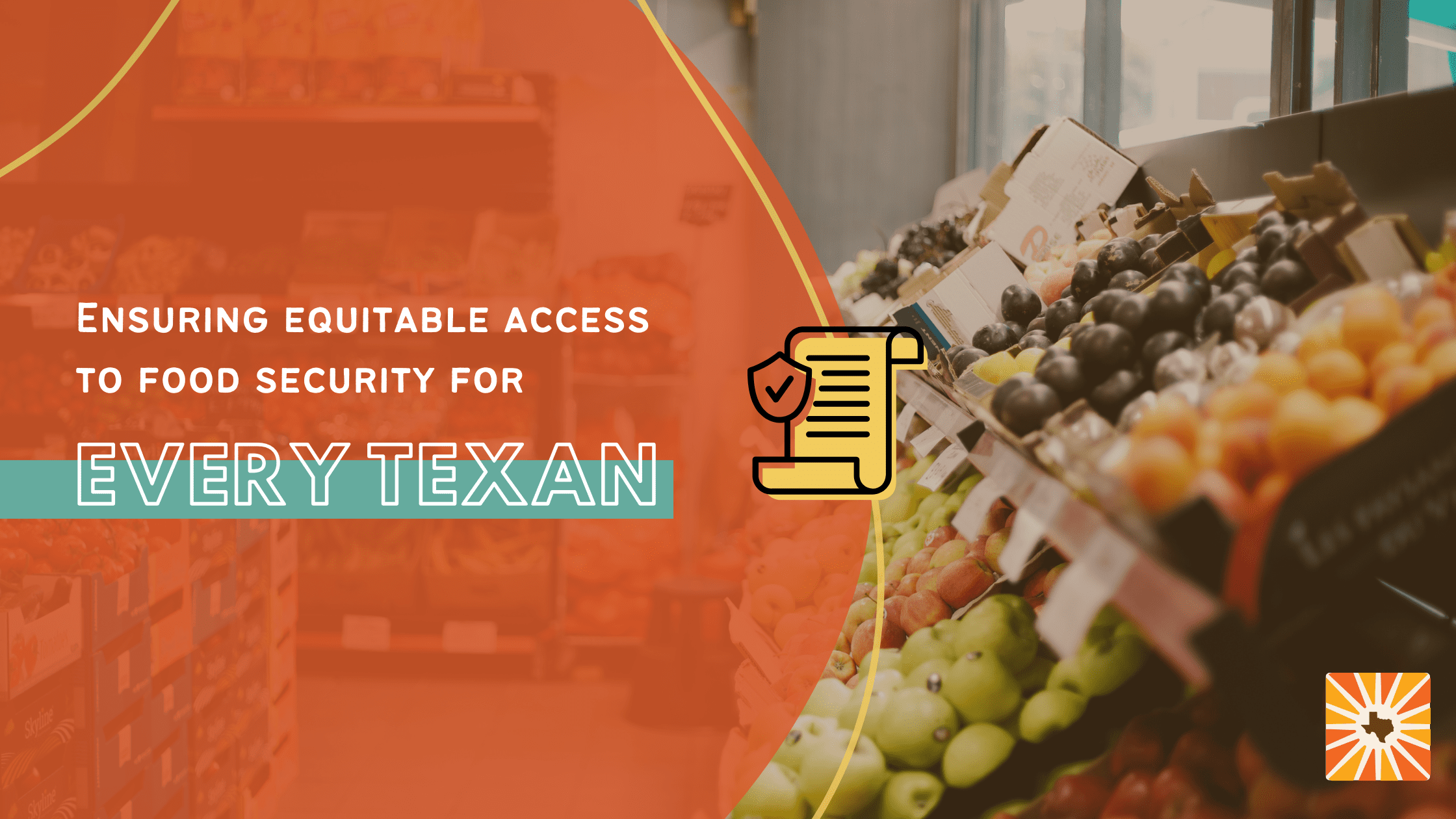As Texas dives headlong into its 89th legislative session, all eyes are on the Capitol. However, we don’t want to lose the forest for the trees. Texas may have to set its budget before we know what happens in Washington, D.C. Many of the bills currently introduced in the Texas House and Senate are federally funded through the ‘farm bill’ (the Agriculture Improvement Act of 2018). Without the farm bill, Texas cannot sufficiently fund school meals or the Supplemental Nutrition Assistance Program (SNAP).
Texans must act now. This is a particularly challenging year, as the current provisions for reauthorization expired on Sept. 30, 2024. Republicans reportedly let it expire intentionally so that it could be reviewed under the new administration. The last time this budget changed was in 2018.
What’s the Problem?
The presidential election and congressional tactics at the federal level left the farm bill idling until now. We may need a temporary farm bill (by Dec. 20, 2024) to get us through until January’s budget reconciliation (the congressional process of approving the federal budget). This means that the Trump administration has an additional opportunity to cut spending on food and nutrition-based assistance, identified by his platform in both Project 25 and Agenda 47 as opportunities for spending cuts.
Partisan politicians are using the urgent need to pass the bill to pit farmers against individuals receiving food and nutrition benefits. 80% of the current (2018) bill is earmarked for food and nutrition programs. Before the presidential election, Republicans indicated they would allow the benefits at current levels, but in turn would permanently remove the ability for any future president to increase the benefits. This is unacceptable. If funding for farmers can increase based on market forces, so can food and nutrition benefits.
Is There a Solution?
Currently, talks indicate that Congress will either pass a resolution to extend the current version of the bill for one year, through September 2025, or pass a new five-year farm bill by Dec. 20, 2024. A major point of contention is that Senate Republicans are pushing for around $10-15 billion in emergency aid to farmers – innocuous enough, except that they want to pull the money from the nutrition programs’ funding. In turn, Senate Democrats –namely Senator Debbie Stabenow – put forth a farm bill that suggested using money from the Inflation Reduction Act (IRA) to fund the aid for farmers. Under the Democrats’ proposal, Texas would get the largest share of the payments and be able to feed its communities. Many viewed the Democrats’ proposal as a win-win, but conservative hold outs are standing firmly against, as Speaker Johnson maintains the GOP will not support IRA funding. Quoted in Dec. 14’s Hagstrom Report, Stabenow and Scott explained: “Republican leadership turned down this $10 billion proposal, rejecting needed economic assistance and increased conservation spending for decades. It is important to stress that this proposal is paid for and does not take any funding away from the critical natural disaster aid that has been requested.” Stabenow’s plan had funding for both farmers and SNAP, but because the GOP refused this compromise, we are at a stalemate with all farm bill-related funding ending on Dec. 20. It is pure partisan posturing that the bill cannot get passed.
It is true that farmers are hurting and need financial support, especially as climate change continues to worsen. Farmers are key in supporting efforts toward food security, however support for them should not be contingent on other Texans going hungry.
Why Should You Care?
Our great state has higher food insecurity than the national average, yet both federal and state governments are poised to slash more funding. The 89th Legislature is considering spending cuts on school lunches, school breakfasts, and who and what SNAP will cover going forward. If a conservative federal government is signaling their support of these cuts, we know Texas will follow suit.
In addition to potential federal and state cuts to food and nutrition programs, Texas chose to leave nearly $500 million in the hands of the federal government rather than use it to feed approximately 3.7 million kids this summer. Summer EBT funding is a permanent federal benefit, one that Texas chooses not to apply for. Refusing these funds further exacerbates food insecurity in Texas; if SNAP is cut at federal and local levels, our already overstretched food banks – who are also dependent on funds tied to the farm bill – will be used to fill in the gaps. Many Texas children will go hungry. Childhood hunger is shown to decrease academic success, mental health, and of course, physical health.
What Can You Do?
The farm bill will foreshadow what’s to come in Texas. If you have school-aged children or support health and well-being assistance for Texans, you should follow what happens to this and other key pieces of state legislation. We need federal funds and state support to continue growing our strong, healthy, and educated workforce.
- Call your representatives, senators, and the agricultural committee chairs and tell them that allowing Texans to go hungry is unacceptable. Look up your elected officials here.
Upcoming legislation regarding Texans’ food and nutrition funded by the farm bill:
- HB 314 – A proposal to recertify SNAP benefits annually instead of biannually.
- HB 820 – An exemption from additional work requirement for students enrolled at least half time and working in federal/state work-study programs.
- HB 567 – Allows a grace period for students with insufficient balances on their meal cards and allows students the ability to donate their balances to other students.
- HB 434 – Allows SNAP to cover food delivery fees for qualified elderly and disabled recipients.

